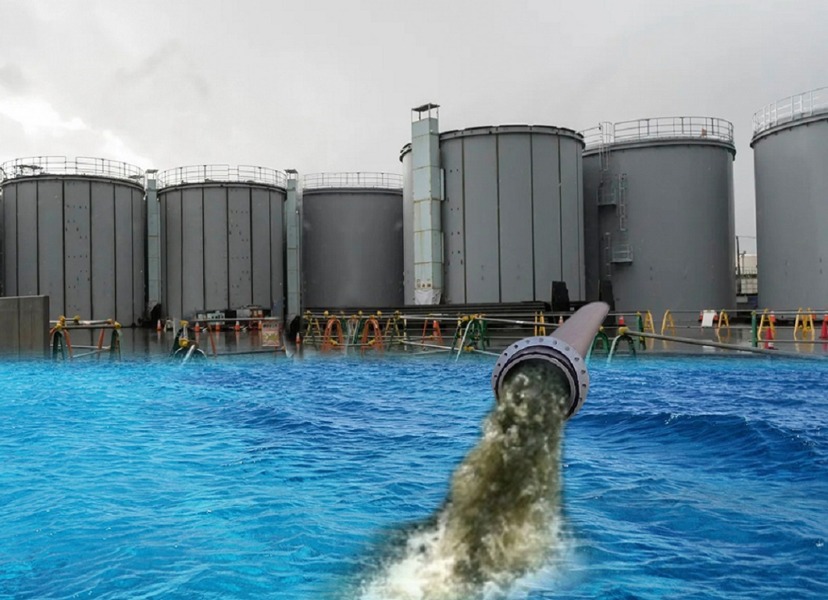From Crisis to Controversy: Japan To Release 1 Million Tonnes Of Nuclear Waste Into The Pacific Ocean
- TDS News
- Asia
- Breaking News
- Canada
- China
- East Asia
- June 15, 2023

The devastating nuclear meltdown at the Fukushima Daiichi plant in 2011 continues to haunt people’s memories worldwide. The catastrophic event profoundly impacted the environment, human lives, and future generations. In response, Japan took on the immense task of collecting and storing significant amounts of contaminated water, assuring the public that it would be thoroughly treated before disposal.
However, the recent decision by the Japanese government to allow TEPCO, the owner of the Fukushima Daiichi nuclear plant, to release one million tonnes of treated nuclear waste into the Pacific Ocean over a 30 year span, has triggered an overwhelming global response of outrage and a resounding call for environmental accountability.
This unprecedented move has not only sparked deep concerns among Japanese fishers and ignited protests among citizens but has also garnered strong international condemnation. Greenpeace scientists have passionately refuted Japan’s claims of effective liquid processing, shedding light on the potential long-term consequences for marine life and public health. The gravity of this decision demands urgent attention and a reevaluation of responsible waste management.
Their impassioned arguments resonate with the millions of concerned individuals who fear the long-term consequences of Japan’s actions. Contrary to Japan’s assertions that the discharges would be cleared within three decades, experts argue that the releases will continue for generations, stretching well into the next century. This revelation underscores the urgent need for Japan to explore alternative long-term storage options and take responsibility for ensuring the safety of future generations and marine ecosystems.
Renowned specialists worldwide, driven by moral duty, have joined the chorus of opposition. They call for an immediate halt to the planned release and advocate for containment solutions that keep the water away from the ocean, allowing for continuous treatment as technological advancements progress. These impassioned pleas for responsible decision-making and environmental stewardship resonate with those who recognize the intrinsic value of safeguarding our planet and its delicate ecosystems.
At this year’s May G7 meeting in Sapporo, where the climate ministers met, Japan claimed it had the international endorsement for its plan to dump nuclear waste into the Pacific Ocean but was faced swift and resolute opposition from global leaders. German Minister for the Environment, Nature Conservation, Nuclear Safety, and Consumer Protection, Steffi Lemke, firmly rebuked Japan’s assertions, highlighting the country’s positive ongoing efforts to contain radioactive waste. Lemke’s refusal to endorse the release of treated water emphasizes the gravity of the situation and the urgent need for reconsideration.
The Spokesperson of the Ministry of Foreign Affairs of China, Wang Wenbin, expressed his disapproval, stating that the discharge of nuclear-contaminated water is not solely a domestic matter of Japan. He passionately declared that Japan’s actions are irresponsible and disregard the global marine environment and public health, striking at the heart of international solidarity and shared responsibility.
The emotional outcry from neighbouring South Korea demands transparency and urges a thorough assessment of safety measures by the International Atomic Energy Agency (IAEA). The Pacific Islands Forum, representing 16 countries, has united in condemning Japan’s decision, echoing the calls for comprehensive studies and increased data to understand the potential consequences fully. The collective voice of international opposition underscores the urgency of reevaluating this course of action and exploring alternative solutions.
The Pacific makes up half of the Earth’s Ocean, is home to more marine species than any other ocean basin on the planet, and provides 70% of the global fish catch.
These concerns are paramount for Canada, a country heavily reliant on seafood exports and imports from the Pacific Ocean. In 2011, faint concentrations of Cesium-134 and Cesium-137 were detected off the coast of Ucluelet, British Columbia. Although these doses pose no significant threat to water safety, they are a haunting reminder of the unpredictable nature of radioactive materials and their potential to traverse vast distances through ocean currents.
With the sustained release of diluted radioactive waste into the Pacific Ocean, there exists a critical knowledge gap regarding the long-term effects on the coastal regions of Vancouver over a 30-year period. The emotional weight of this uncertainty weighs heavily on those who deeply care about the wellbeing of our oceans and the ecosystems they support.
While the current level of contamination may be minimal, the release of treated nuclear waste into the ocean introduces the unsettling possibility of trace amounts of nuclear contaminants making their way into Canadian waters and food sources over time. The emotional toll of such a scenario cannot be underestimated, as it casts a shadow of doubt and fear over the safety and wellbeing of Canadian citizens.
Canada’s Minister of Climate Change, Guilbeault, must take a more assertive stance against Japan releasing nuclear wastewater into the Pacific Ocean. He must take a proactive approach on this matter, as he has done with reducing coal and other elements that could affect the wellbeing of all Canadians.
It is a stark reminder that we, as a global community, must reassess the necessity of nuclear power and weapons. Only through collective reflection and proactive action can we strive to protect our oceans, preserve the delicate balance of marine ecosystems, and ensure the safety and wellbeing of current and future generations.








